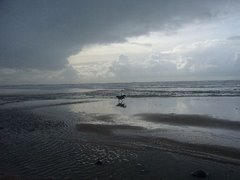The
other day I was Ozzy’s third bite victim.
In the summer, Ozzy had pinched a piece of wood
and took it under the table. When my
husband went to retrieve it, Ozzy snapped.
He did not draw blood. There were
tooth marks and a bruise. The friend who
came to stay had put her handbag on the floor by the table leg. When she went to get something out of it,
Ozzy snapped. He did not draw blood. Tooth marks and bruising. His ball was close to the bag. After these two incidents we were advised to have
Ozzy castrated. We did and his behaviour
changed. He has become more placid, less
agitated, less macho, less "doggy", less amorous towards male visitors.
A few days ago, Ozzy went to pinch something
unsavoury out of the rubbish bin. I went
up to him to take it out of his mouth.
He bit my hand.
So where does that leave Ozzy?
I know what my vet would say. He should be put
down. Some caring friends who have no
experience with dogs, say the same and I understand their arguments.
When Ozzy steals something and takes it under
the table, it’s his. When he steals food
or food related items such as oven gloves or tea towels, he is a liability when
you want to take it out of his mouth.
This is the only time he shows aggressive behaviour. And of course he is not a Chihuahua
How can a family pet who is generally obedient
behave like this? He never growls, does
not threaten. I can take his food bowl
away when he eats. He obeys to the
commands he has been thought. Comes back
in the forest when called. He is not
aggressive towards other dogs or towards humans although he has to check out strangers
before befriending them. He is not a dangerous
dog. He does not get upset if another
dog takes his ball or his stick. He does
not attack other dogs or humans. He is
clever and smart. Wants cuddles.
It’s a known fact that Australian shepherds
have a nervous disposition.
My friend, Jules, who is 85 years old and knows
all there is to know about dogs, says it’s our fault for not being strong pack
leaders. We are too soft and lenient
with Ozzy. He thinks that we will succeed with boot camp type training and
attitude change on our behalf.
I want to give Ozzy another chance but will we
succeed?
I am reading all my books of wisdom for help.
I feel we have to seek advice from people who
know about dog behaviour.
How do you go about finding somebody who is not
a charlatan? Anybody can call himself a
behaviourist in Belgium
As a qualified dog trainer, I feel this is a
real challenge.








